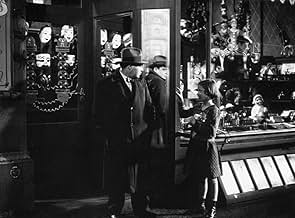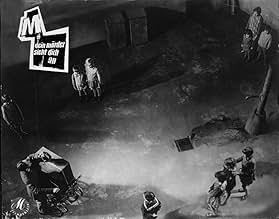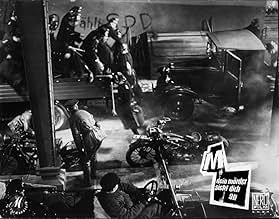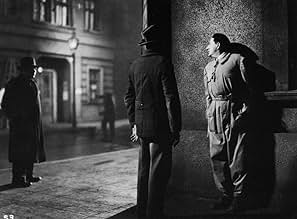When the police in a German city are unable to catch a child-murderer, other criminals join in the manhunt.When the police in a German city are unable to catch a child-murderer, other criminals join in the manhunt.When the police in a German city are unable to catch a child-murderer, other criminals join in the manhunt.
- Director
- Writers
- Stars
- Awards
- 2 wins total
- Director
- Writers
- All cast & crew
- Production, box office & more at IMDbPro
Summary
Featured reviews
The murderer, artfully played by Peter Lorre, has been killing children that have no link to him personally for months. The police, despite all of their efforts, are unable to catch him, mainly because there is no rhyme or reason in his choice of victims. At first there is a focus on the victims and the hole left in their families by their killing. Then, the film shifts to two normally opposed groups - the police and the underworld. After several months of no results by the authorities, the police are unhappy because it reflects badly upon them, and the underworld is unhappy because their activities are being disrupted because of the police doing constant raids in their efforts to capture the killer.
In a particularly well-done part of the film the scene shifts back and forth between a conference of police and one of the underworld. They discuss how they are going to catch the killer. The police settle upon the idea of looking for people with a history of past mental problems that were pronounced cured and released. The underworld decides to enlist an invisible group - the beggars - to follow every child at all times and therefore catch the killer. Both groups focus on the right suspect, the question is - who gets there first? M is a fascinating film that raises many topics - the death penalty, a group of criminals that are criminals by choice causing less stress on society than a lone criminal that acts out of an uncontrollable compulsion, and the motivations of the authorities often being their own bureaucratic survival rather than the larger issue of ending a series of horrible acts against humanity.
The film is lead by Peter Lorre in a transcending performance who plays the serial killer and rapist in which the film is centered around. In this performance Lorre is successful in something that at the very least is rare to see in any kind of film, compassion for a child killer and rapist. Lorre makes the viewer see, that he is not a criminal by choice but by a sickness of compulsion. Too often then not is our perception of a psychotic killer having that look that puts fear into his or hers victims' eyes. Lorre doesn't do that but rather displays a frightened man, a scared man. One in which his desperation leads to his hazardous behavior. His portrayal of a killer is not of a fearless one but of one consumed by fear. Something that even today we as a people cannot understand, let alone in 1931.
The direction and writing of Fritz Lang is beyond comprehensible as he taps into the mind of a serial killer and his complexities. He does so in such that we get an empathetic and compassionate illustration of all sides of the story. This in which by then end of the film all points of view are more then well delivered to the audience. Fritz Lang here, has simply created here a timeless masterpiece. One that excels in its technical aspects and enlightens the audience on a topic that other films still have not yet to match M in.
I highly recommend this film for many obvious reasons and conclusions. This film was created by one of the all time great directors in Fritz Lang, Lang's command for the screen is mesmerizing and a joy to witness and so on and so forth. Yet much of this is mostly superficial and a waste of time to continuously state. M, as I mentioned before takes a strong and original stance on an issue that we as a society yet have not fully resolved. This film may not give you THE answer on this issue but it may sway that moral compass of yours that lies inside of all of us.
This film is ground-breaking for many reasons: It is Fritz Lang's first talking picture, it is one of the first in the serial killer genre and it was overtly anti-Nazi. This film was banned in Germany shortly after it premiered, and Fritz Lang and Peter Lorre, both Jews, soon fled the country. It has superb acting (most notably, Peter Lorre's trial scene in the catacombs) and very stark yet at times gritty cinematography. The story is indeed suspenseful and at times, very creepy (what whistling child killer isn't?). The entire movie, however is extremely thought-provoking and challenging, much like the German Expressionist movement itself.
This is not a movie for everyone; some may find it boring, some may find it too abstract. It also has one of the most bizarre shots I've ever seen in film - essentially it's a 30 second shot of the police inspector talking on the phone, but you're under his desk and looking up his pants leg. It actually kind of baffled me and made me chuckle for a second, but it was avant garde if anything.
To those who appreciate early cinema that truly makes you think, both about the film and the subtext with which it was written and filmed, it is a must-see.
--Shelly
Ultimately this film asks the question: what makes us who we are, how responsible are we for our actions and what should be done about it and by whom? To this day, as subjective a set of questions as you could wish to ask - but ones we will forever continue to try and answer and cinema will continue to catch in its shadows.
It is a film devoid of typical humanitarian propaganda, yet it is not the case that we immediately feel the need to relate to the child murderer Hans Beckert ( Peter Lorre ) since Fritz Lang also shows us the effects his gruesome crimes have in the form of the police constantly raiding establishments, the grieving parents & random people accusing eachother of the murders. It is not a movie that forces its opinion on you, but causes you to think about what is truly right and wrong. Hans later claims he cannot help himself because he has an irresistible compulsive urge to kill which cannot be stopped, much to the dismay of other career crooks who claim they only commit crimes to survive and take no pleasure or feel no compulsion towards it. It is a psychological kind of movie that is still as relevant as ever today as it was in 1931.
Peter Lorre is ofcourse the perfect fit for the psychopathic child murderer, he has the perfect innocent wide eyed look for a psychopath, who seems to even be likeable when he is not murdering children. His signature whistle by Edvard Grieg - In the Hall of the Mountain King is a nice creepy addition to his character which he uses to lure kids to their doom. Ofcourse the incredible shot at the start which focuses on Hans's shadow on the poster that lists his crimes and reward for capture while talking to a little girl before killing her is a great ironic symbolism to announce his character.
It was Lang's first sound picture, yet only two third of the movie was shot with actual sound while everything else was shot silent. This was primarily to keep the costs down since sound equipment was very expensive at the time. It creates a weird mix in constant transitioning from silent to sound. Yet as Lang has stated it adds another layer to the eeriness the movie has, so it only enhances the experience instead of unimmersing you out of the film.
The cinematography is revolutionary in its use of low key lightning, which is a technique that was used many times after in the classic Film Noir era in Hollywood. The result is many Film Noirs share a visual resemblance with M due to their dark tone. Not only visually, but psychologically many themes of M have been repeated throughout the years in cinema. It was one of the first instances of a semi-sympathetic look on a pure psychopathic murderer, which has been repeated countless times in later years.
Some might feel sorry for Beckert for having this affliction of which he cannot be helped while others would prefer to see him hang, the movie doesn't shove the right answer down our throats, and it's possible to look at it from either way without having a right answer. It is a sociological thinking man's picture that is as relevant now as it ever was.
Did you know
- TriviaContrary to popular belief, Fritz Lang did not change the title from "The Murderers are Among Us" to "M" due to fear of persecution by the Nazis. He changed the title during filming, influenced by the scene where one of the criminals writes the letter on his hand. Lang thought "M" was a more interesting title.
- GoofsIn one of the police crack-down scenes, the German bar hostess keeps referring to the uniformed police officer in charge as "Herr Hauptmann." The English caption translates this as "sergeant." But, in actuality, "hauptmann" is equivalent to "captain".
- Quotes
Hans Beckert: I can't help what I do! I can't help it, I can't...
Criminal: The old story! We never can help it in court!
Hans Beckert: What do you know about it? Who are you anyway? Who are you? Criminals? Are you proud of yourselves? Proud of breaking safes or cheating at cards? Things you could just as well keep your fingers off. You wouldn't need to do all that if you'd learn a proper trade or if you'd work. If you weren't a bunch of lazy bastards. But I... I can't help myself! I have no control over this, this evil thing inside of me, the fire, the voices, the torment!
Schraenker: Do you mean to say that you have to murder?
Hans Beckert: It's there all the time, driving me out to wander the streets, following me, silently, but I can feel it there. It's me, pursuing myself! I want to escape, to escape from myself! But it's impossible. I can't escape, I have to obey it. I have to run, run... endless streets. I want to escape, to get away! And I'm pursued by ghosts. Ghosts of mothers and of those children... they never leave me. They are always there... always, always, always!, except when I do it, when I... Then I can't remember anything. And afterwards I see those posters and read what I've done, and read, and read... did I do that? But I can't remember anything about it! But who will believe me? Who knows what it's like to be me? How I'm forced to act... how I must, must... don't want to, must! Don't want to, but must! And then a voice screams! I can't bear to hear it! I can't go on! I can't... I can't...
- Crazy creditsAll of the original credits appear only in the beginning with no music.
- Alternate versionsIn the English and French language versions, in addition to having been dubbed, had some footage re shot. These scenes include the telephone conversation between the minister and the police commissioner, and the ending of the film. Peter Lorre's performance in the trial was re shot, however this time he spoke his lines in English or French, depending upon the version. The shots of him are lit and photographed much differently than Fritz Lang's original footage. Additionally, a shot of the police arriving was inserted, taken from an earlier part of the film (whereas in the original German version no police forces are shown at all). The court scenes have been eliminated and replaced with happy endings where young children play a game similar to the one seen in the opening (English) or a smiling couple watching their children play in the street (French).
- ConnectionsEdited into Juden ohne Maske (1937)
Details
Box office
- Gross US & Canada
- $35,566
- Opening weekend US & Canada
- $6,123
- Mar 17, 2013
- Gross worldwide
- $35,566
- Runtime
- 1h 39m(99 min)
- Color
- Sound mix
- Aspect ratio
- 1.19 : 1
- 1.20 : 1

































